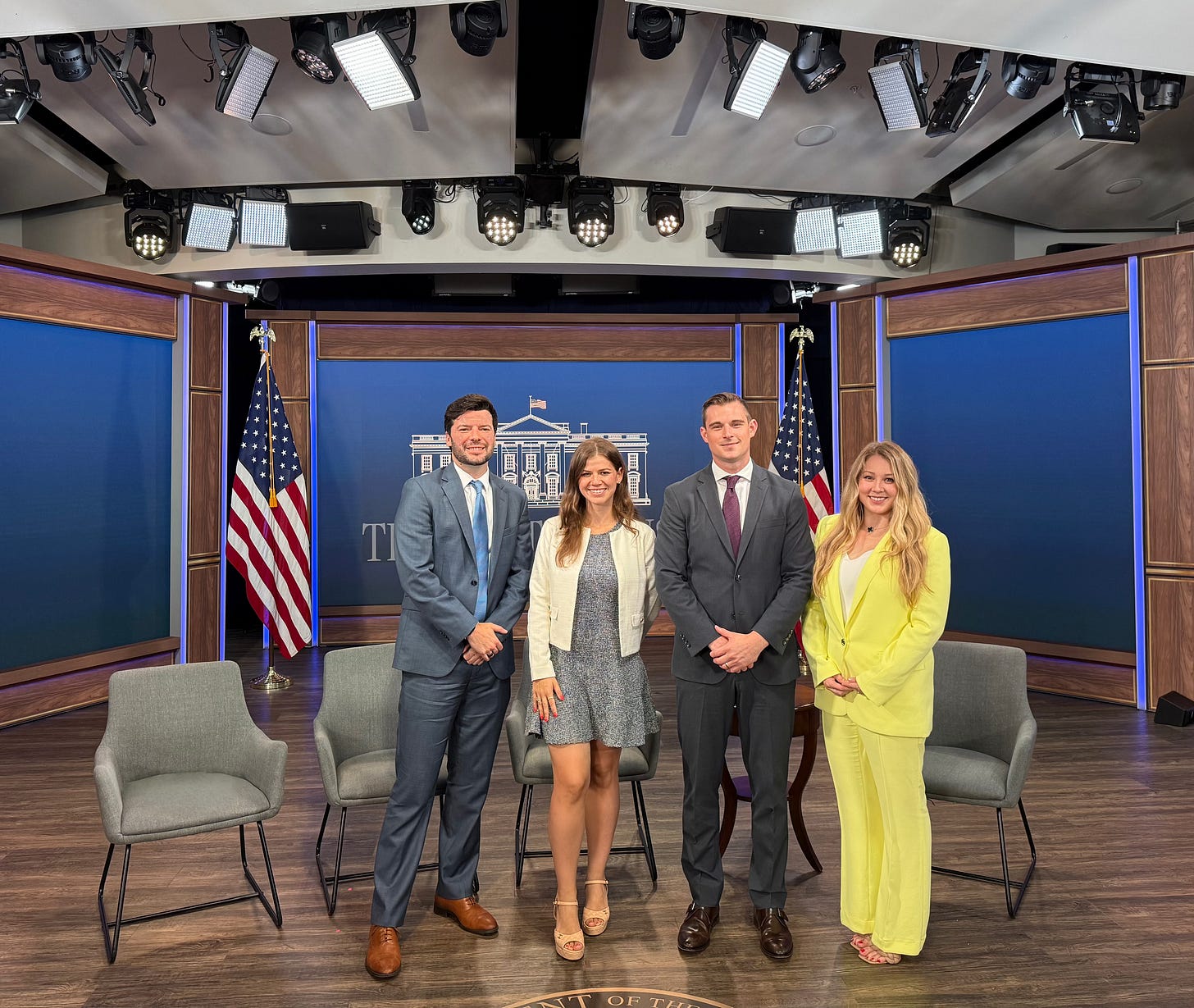Inside the White House’s Crypto Strategy: Bo Hines Talks BSA Clarity, Roman Storm, and the CFTC
Hines shares an exclusive first look at the White House crypto report and offers fresh insight on Quintenz and the Tornado Cash trial
The Crypto In America team sat down Wednesday morning with Bo Hines, Executive Director of the White House Crypto Council, to break down the administration’s long-awaited interagency report on digital assets.
Beyond the report’s key recommendations, we dug into some of today’s hottest topics in crypto policy — from the pending nomination of Brian Quintenz to lead the Commodity Futures Trading Commission, to the criminal trial of software developer Roman Storm, where a verdict is expected later this week.
Let’s dive into some of the highlights…
In the report:
Congress is urged to build on the bipartisan momentum behind the House’s market structure bill — the CLARITY Act — by granting the CFTC authority over spot markets for digital commodities as well as embracing DeFi’s potential.
What Bo told us:
Finding the right leader for the CFTC is a top priority for the administration.
Although President Trump has already nominated Brian Quintenz for the role, the Senate Agriculture Committee says a recent delay in advancing his nomination came at the request of the White House.
Hines did not speak to the reason behind the pause, but emphasized the importance of getting the right person in place.
“It's very important that we find a tremendous leader. I think that in terms of the CFTC…we'll need someone that truly understands the space as well.”
He continued…
“The personnel team's gonna work extremely hard to do that. And it could be Brian, it could be, you know, we'll see what happens.”
He added that he’s had “fantastic interactions” with Quintenz and acknowledged the strong industry support behind him, while expressing confidence that “the folks with the power to make decisions here will make the right one.”
In the report:
Recommendations for modernizing anti-money laundering rules, specifically the Bank Secrecy Act. While any changes to the BSA would require congressional approval, the report calls on Treasury and other regulators to clarify BSA obligations and reporting requirements. It also stresses the importance of preventing misuse of enforcement powers that could unfairly target law-abiding citizens. Importantly, the report supports lawful self-custody and urges clearer AML expectations for DeFi projects.
What Bo told us:
Expect additional guidance from the DOJ beyond the Blanche memo issued in April, which made clear the agency will no longer pursue “regulation by prosecution” in digital asset enforcement.
“I think that’s extremely important. Again, setting the ground rules and showing folks exactly what you can and can't do.”
When asked about the ongoing Roman Storm case and how the Trump administration squares its prosecution with its stated rollback of efforts targeting authors of neutral software, Hines pointed to the Treasury’s decision to drop sanctions against Tornado Cash and emphasized that the administration remains unified in its crypto approach. He also referenced the forthcoming DOJ guidance, suggesting it may address elements relevant to the Storm case.
A verdict in the Storm trial is expected by the end of the week.
In the report:
Urging for swift implementation of the GENIUS Act and for Congress to pass the Anti-CBDC Surveillance State Act, permanently banning central bank digital currencies and protecting American’s privacy and civil liberties.
What Bo told us:
He didn’t mince words, stating that the federal government will never issue a stablecoin — and firmly opposes anything resembling a central bank digital currency.
“We don’t want to even flirt with the line of a CBDC. We don’t want Big Brother spying on American consumers. We feel extremely strongly that CBDCs should never exist, and I think the GENIUS Act effectively accomplishes that.”
In the report:
Calls for clearer, more practical tax rules on digital assets. It recommends Treasury and the IRS update guidance on staking and mining, while additionally publishing guidance on topics related to CAMT, wrapping transactions, and de minimis receipts of digital assets. It also recommends that Congress formally recognize digital assets as a distinct asset class with tailored tax treatment, including applying wash sale rules to crypto.
What Bo told us:
The report reflects the administration’s commitment to updating the existing tax code so digital assets are treated fairly and consistently with other financial instruments.
“There's several things that we addressed in this report that I think the industry will be pleased with. We don’t want this space to be treated differently than any other space.”
Missing from the report:
There was no mention of a strategic Bitcoin reserve or how the government plans to fund the accumulation of more of the world’s largest digital asset.
What Bo told us:
The administration supports having a digital asset reserve and believes in accumulating assets like Bitcoin, as long as it's done in a budget-neutral way. He emphasized there are countless methods to accumulate, and the government will act on the ones that can be implemented quickly and efficiently.
“We understand the importance of the strategic Bitcoin reserve. We are enormous fans of Bitcoin and the Bitcoin community, and we wanna deliver for them as well. And I'm certain that we will.”
Watch the full interview on all platforms here.
Remember, new editions of the Crypto In America newsletter drop every Monday, Wednesday and Friday at 7AM EST.
If you like what you’re reading, don’t forget to subscribe!





Good morning,
Thank you all always for your commitment to reporting. I am looking to get a copy of The White House Crypto Report, any direction or advice from you would be greatly appreciated.
Steve